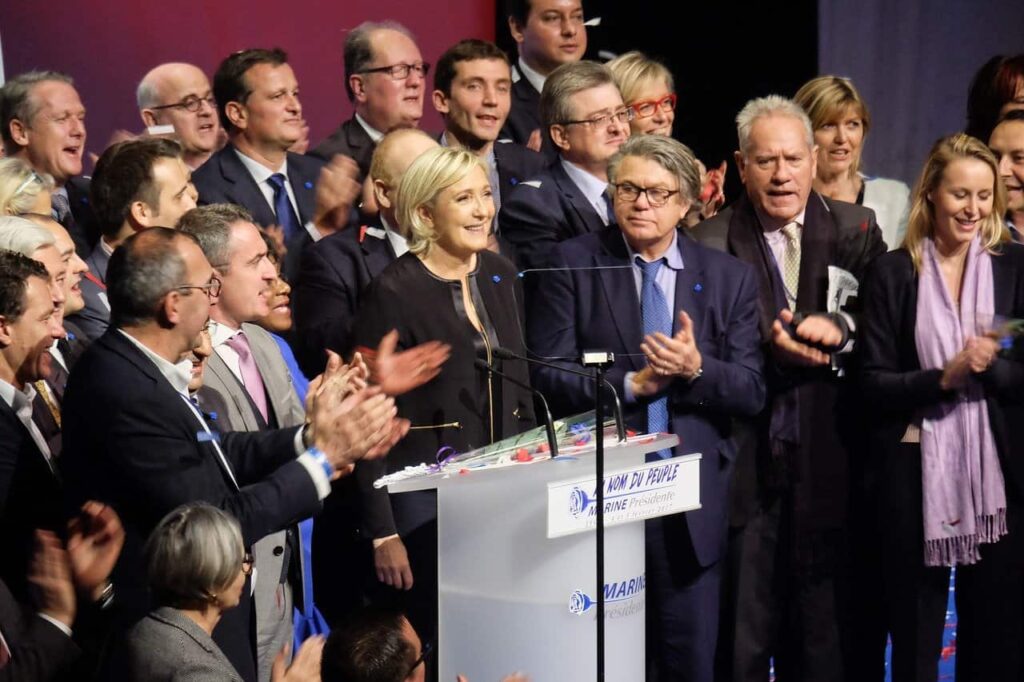Vestigo Volatility Score: 50%
France will hold a presidential election on April 10, with a second election round scheduled for April 24 should no candidate secure a majority in the poll. President Emmanuel Macron is vying for a second term in office, a feat no French president has achieved since Jacques Chirac was reelected as France’s president in 2002. While Macron is currently the election frontrunner, he faces strong competition from both sides of the French political spectrum. The more conservative candidates have particularly strong momentum, at least according to the latest polls. Notably, the path to a Macron victory is not as clear-cut as the media has touted. Those in support of a more severe immigration policy and other hardline social views may coalesce under one banner in the election’s second round, presenting Macron stiff opposition.
Constraints to Consider
- While Macron currently leads voting intention, a crowded field of candidates diminishes his overall popularity
- Very few French presidents in recent history have secured second terms in office
- Russia’s invasion of Ukraine, driving a widescale refugee emergency in Europe, could influence public sentiment towards anti-immigration candidates
What the polls are saying
Recent polls, completed March 7 after officials published the approved candidate list for the upcoming election, show Macron ahead of the crowded pack. His popularity hovers around 30 percent of the voting intention. The polling average since May 2021 has given Macron the highest popular support of the candidates in the running. Surveyed individuals have occasionally thrown in their hats for far-right candidate Marine Le Pen, but these polls are few and far between. Notwithstanding, Le Pen had an average popularity above that of Macron in the general polls prior to May 2021. Population sentiment is fickle, and could shift again in the coming weeks.
Le Pen, arguably, has lost ground to Eric Zemmour, another nationalist and far-right candidate. Zemmour officially declared his candidacy late last year, a time which coincides with a shift of support away from Le Pen. Valerie Pecresse is another candidate currently polling well, a recent survey giving her 13 percent of the voting intention. This is almost half of the support Macron currently fields. Pecresse’s social policy views, including her stance on immigration and vocal opposition to same-sex marriage, are somewhat similar to the views of Le Pen and Zemmour. If one of the three candidates contests in the second round, an outcome with high probability, it is not a stretch to imagine populace support for one translating into backing for one of the others.
Immigration policy likely to be a major driver in electorate interest
The migration debate, a recurring feature during French election cycles, has become a pivotal issue in the run-up to the current election. The debate plays on people’s emotions, driving many presidential hopefuls to criticize France’s management of immigration to gain advantage over rivals. Macron himself, one of the more centrist of the candidates, emphasized the need to bolster the EU’s borders against individuals seeking to enter the bloc illegally. However, it is the popularity of the far-right candidates, and their more extreme rhetoric, that indicates an increasingly severe anti-immigration sentiment within France.
The crisis in Ukraine is like pouring fuel on the fire of the emotions of those wanting to tout a protectionist strategy. Russia’s invasion into Ukraine has already driven over 2 million refugees to flee the crisis and make their way into neighboring countries, in what is fast becoming the largest European migration since the Second World War. The far-right candidate Zemmour recently praised Britain’s comparably stricter policy to accepting Ukrainian refugees. While European countries have largely accepted Ukrainians in need, the collective popularity of Le Pen, Zemmour, and Pecresse speaks to an underlying dissatisfaction with current immigration policy that is likely to be a key influencer when voters pick up their pencils at the ballot box.
A tight race
The constraints suggest a much closer election contest than the media has proclaimed. While Macron leads France’s voting intention in major polls, the collective popularity of more conservative candidates may offer Macron stiff resistance in a second round on April 24, as those more radical segments of the population seek to band together to dislodge Macron from his podium. Notably, the opposite is also true. More centrist and left-wing elements of the population that will not back Macron in the first round will likely do so on April 24, to quash the prospect of a Le Pen or a Zemmour securing the mantle. A less talked about possibility, but one very much conceivable, might see Macron toppled in the first round itself.
We base the percentage of our Volatility Score on the material constraints that determine the potential of a global event becoming a long-term global disruptor. We think that anything above the 75% mark should be studied with particular interest.

